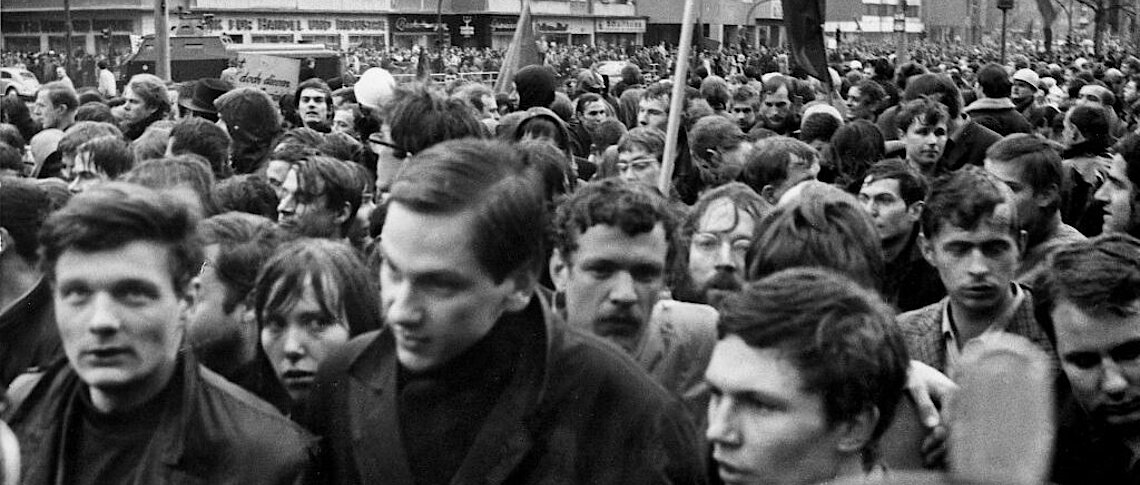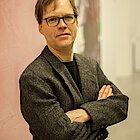On the streets of Germany today, you might encounter demonstrators brandishing brash, homemade placards hoisted high on broom handles, or protesters displaying symbols of different kinds. People young and old call for freedom of the press, decry the political establishment as illegitimate, mock religion and appeal to the vulnerable.
Much of this might sound familiar to those who have experienced leftist campaigns in past decades, especially in the 60s and 70s. But today this demonstration would most likely be organised by the likes of Germany’s far-right party, Alternative for Germany (AfD), or one of the movements close to it, such as Pegida, the Reichsbürger Movement or the Identitarian Movement Germany.
Fifty years after Europe’s student movements marched in the streets from Scandinavia to Yugoslavia, 1968 has never been more relevant. In Germany, France, Sweden, the Netherlands and elsewhere, the liberal conclusions of the late 60s protests – and, just as critically, their methods – are at the heart of the existential crisis that is shaking Europe’s enlightened, democratic foundations. The ongoing battle over 1968’s legacy will determine whether Europe remains on its postwar path or swerves to the right.
If the far right succeeds in overturning the post-1960s cultural revolution – and this has already begun – it will have the student-led anarcho-leftists to thank. The national populists, Identitarians and hard right have deftly co-opted the tactics of their nemeses and applied them auspiciously to their cause.
Revenge for 1968
The European right’s rear-guard warfare against the post-1960s cultural assumptions started long ago, in the aftermath of the student movements, when the left-wing penetration of the mainstream commenced. In Germany, arch-conservatives like West Germany’s Bavarian Christian Democrat Franz-Josef Strauss, as well as the hard neo-Nazi right, sounded the alarm, though they would never have suspected that the full-blown cultural revolution would dramatically transform all of Germany. Strauss would have turned in his grave when a Social Democratic-Green, or red-green, coalition government took office in Berlin in 1998, the apex of the long march through the institutions.
Today, the far right’s core objections to the liberal credo are nearly identical, yet they enjoy infinitely more traction. AfD, represented in the Bundestag for the first time, rails against the ‘morally degenerate, left-red-green, filthy 68er Germany’. The source of this insight, AfD spokesperson Jörg Meuthen, has said: ‘The liberation from the National Socialist mindset is an accomplishment of the 68ers. But over the decades, conservative values have become lost too. The country is deeply social-democratised and free of patriotism, which I strictly separate from nationalism. The country has fallen into valueless relativism.’ The right’s mission, according to Meuthen: revenge for 1968, using the liberals’ own weapons to destroy its creations.
In light of the right’s repudiation of the student revolt and its aftershocks, it is astounding that they manage to remove the ideological blinkers long enough to borrow from it.
Just about every element in the far right’s programme – in Germany and in general – is a response to what the left-liberals have created of their countries. Instead of a restrained state respectful of civil liberties and individual freedom, the hard right calls for a strong, authoritarian state that provides its native citizen with fewer choices and maximum security. Above engaged civic democracy, they tout duty, loyalty and Vaterlandsliebe, love of the fatherland. Traditional families with a patriarch at its fore buttress society, flanked by Christianity and the church – exactly what the 60s students rebelled against. Social justice, a term associated with social democracy, means the welfare of all native Germans, not all citizens of the state. In the Volksgemeinschaft, or ethnic community, a Nazi term they usually avoid although this is what they mean, all members of the blood-based, national community are equal. Those outside it – immigrants, refugees, Muslims, Jews – corrupt the volkish order.
Of course, in the right’s eye, ‘multiculturalism’ is at the root of most of society’s ills. This is a red herring whose folly, they claim, illustrates that racism, discrimination and the rejection of immigration have merit that until now has been negated by political correctness. And as for a critical processing of the Nazi era – a demand that shot through the students’ concerns – the rightists claim Germans’ obsession with the evil of the Third Reich is overblown and counterproductive. One prominent AfD member even called the Nazi era a ‘speck of bird poop’ in the nation’s long history.
Discourse before power
In light of the right’s repudiation of the student revolt and its aftershocks, it is astounding that they manage to remove the ideological blinkers long enough to borrow from it. Their success today is at least in part attributable to the lessons they extracted from the left’s means of protest, appeal and politics, and applied to their own purposes. It took a few decades to perfect it, but today they’re using the left’s strategies to their own considerable benefit.
While chancellor Angela Merkel’s Christian Democratic Union ‘is no longer home to many German conservatives’, according to sociologist Thomas Wanger in an article for taz, ‘the AfD is under the leadership of strategically intelligent, right-wing intellectuals, who – despite all the demonstrative opposition – have learned a lot from the 68ers.’
The German New Right, along with its French peers, started newspapers and magazines, clubs, institutes, foundations, publishing houses, and held international congresses that discussed its premises and refined its messages.
This didn’t begin yesterday. Currents in the right realised as early as the 1970s that the prerequisite for a right-wing counterrevolution in politics was a conservative countercultural revolution in German society at large. In other words, it was first at the level of ideas and discourse, not in elections, that the hard right was going to have to win back territory before it could compete for positions in the halls of power.
Hard-headed, old-school neo-Nazi parties like the National Democratic Party of Germany (NPD) tried again and again to do so – and failed, the stink of the beerhall too strong on their breath, their programmes too out of sync with content, middle-of-the-road Germany. The German New Right, along with its French peers, started newspapers and magazines, clubs, institutes, foundations, publishing houses, and held international congresses that discussed its premises and refined its messages. They rediscovered the conservative thinkers of the Weimar era such as Carl Schmitt, Ernst Jünger and Oswald Spengler, and cultivated their own intellectuals.
This way, the New Right occupied a corner of the public sphere and laid the groundwork for right-wing movements with a modern face: something gentler than NPD but harder-hitting than the CDU. ‘The right-wing intellectuals didn’t devise manuals on how to build bombs,’ argues German author Manuel Gogos, ‘but rather they mixed together the most potent poisonous ingredients that could infect the discourse: immigrants and multicultural society, the legacy of the ’68 generation, they were the Occident’s ruin.’
A new generation of anarchy
Despite the New Right’s open-mindedness to cultural revolution, it took a younger generation to tap into the tactics of groups like Subversive Action, a 1960s outfit that included some of the future denizens of West Berlin’s free-love commune, Kommune I. The anarchists used pranks to show up the West German government for what they claimed it was: an undemocratic, single-minded regime that excluded those who criticised the system. The idea was to provoke the system so it would overreact and expose its representatives as hypocrites – revealing the status quo as something transient, just one option among many.
One of the first to pick up on these street tactics was the hard-right publisher Götz Kubitschek. He displayed his debt to anarchist methods first in 2008, at a Humboldt University conference organised by leftist student groups, re-examining the student movement on its 40th anniversary. Kubitschek, then director of a rightist think tank, and a handful of young comrades stormed the podium in a crowded lecture hall, unfurled banners, threw fliers and took over the microphone – a fine homage to the rebels of 1968. They denounced the conference as Marxist and communist, and thus undeserving of space in the university.
This is the far right’s playbook: to shift the republic’s cultural moorings and throw the status quo into question, gradually gaining legitimacy until the Christian Democrats are prepared to form coalitions.
The conference, however, continued, as did Kubitschek. First in France, then Austria and Germany, the Identitarian Movement came to life: a white supremacist, Islamophobic, hard-right grouping, most members in their twenties. It uses civil disobedience and the internet to make points and win attention for its causes. It draws so closely on the left-wing ‘fun guerillas’ of Subversive Action that they even called themselves Conservative Subversive Action until they merged into the Identitarian Movement.
They relish symbolism and publicity stunts, such as placing a severed pig’s head in front of an Arab-run food stall as they did in Paris. In Berlin they scaled the Brandenburg Gate and tossed fliers from it, and occupied the balcony of the Green Party headquarters, setting off pyrotechnics, filming their actions and distributing the images via YouTube and Twitter.
A shift in the cultural moorings
In the Bundestag, the AfD is more restrained, though it too takes from the post-68 left. Nearly 40 years ago, another protest party, called the Greens, appeared on West Germany’s political scene, unwanted by the powers-that-be. They were shunned and mocked in establishment circles, even thrown out of the Bundestag occasionally for ‘bad behaviour’. But they used the parliamentary processes and structures to publicise and direct discussion on their issues: the environment, disarmament, the Third World, women’s rights.
The Social Democrats were certain they’d disappear back into the street movements from which they came. They stayed, however, and the cultural revolution rolled on, and by the 1990s the positions of the once little ‘anti-party party’ were consensual enough to form coalitions with the SPD across the Länder and then, in 1998, at the federal level.
This is the far right’s playbook: to shift the republic’s cultural moorings and throw the status quo into question, gradually gaining legitimacy until the Christian Democrats are prepared to form coalitions. In less than a year in the Bundestag, they have exploited the issue of migration to make headway. Germany’s centre knows this is the plan – but that hasn’t enabled it to slow the far right’s ascendency even a little.






